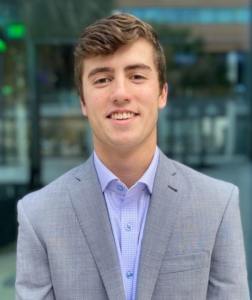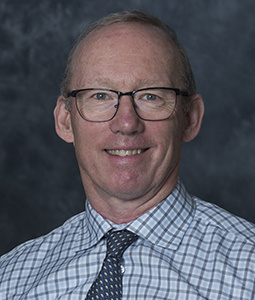
The Trading Lab at the Darla Moore School of Business is a popular gathering place for Carolina Finance Scholars working on company pitches and other school work. Courtesy photo
Spencer Allen, a rising junior majoring in finance and international business, is mapping out a promising career in investment banking. In May, he secured a summer 2023 internship at Jefferies Group – one of Wall Street’s powerhouse bulge bracket investment banks – as a summer analyst in their Aerospace, Defense and Government group.
Allen, like other young business students looking to break into the cut-throat industry, leveraged the alumni network from his business school, connecting with a Jefferies mentor to help him navigate the recruiting and hiring process.
“As a program alum, he also helped review our pitches that we did in the investment banking practicum. He is a prime example of how the program alumni really go to bat for current students,” Allen tells Poets&Quants for Undergrads.
Here’s the catch: Allen isn’t a student at NYU Stern, The Wharton School, Harvard University, or any of the top 25 feeder schools for investment banking. He attends the University of South Carolina’s Darla Moore School of Business, far flung from the finance epicenters in New York City or San Francisco.
Allen is also a Carolina Finance Scholar, a rigorous, application-based program designed specifically to help Darla Moore’a best and brightest break into the top firms in the industry.

Spencer Allen, ’24
“I definitely think the Carolina Finance Scholars Program is punching above their weight. Although the University of South Carolina is not considered a target school, it has been able to break through this barrier and send numerous kids to elite investment banking, consulting, asset management, and wealth management firms,” Allen says. “I have seen students placed at firms such as Goldman Sachs, JPMorgan, Bank of America, Lazard, FT Partners, Jefferies, William Blair, Credit Suisse, Deutsche Bank, and many more, but I have only seen one or two firms directly recruit out of our university for these prestigious careers.”
UNDER THE RADAR
Haley Dietsch, who graduated from Darla Moore in 2020, credits the Carolina Finance Scholars as the main contributing factor to breaking into her first investment banking job as an analyst at Credit Suisse. This August, she’ll begin a new job as a private equity associate at AEA Investors.
Program students, alumni, and faculty say the program punches well above its weight when it comes to placing students in high trajectory banking firms. It’s why we selected the program for our first installment for Under The Radar, a periodic feature series highlighting the hidden gems, the best kept secrets, and innovative programs in undergraduate business education.
“The rigorous curriculum helped me prepare for interviews as well as exposed me to different aspects of finance (such as asset management and consulting) to help me make an educated decision about my career choice. It is a collaborative team environment, and we spent a lot of time informally prepping together through resume reviews and conducting mock interviews,” Dietsch tells P&Q.
“I found the alumni network incredibly receptive to taking networking calls, providing guidance and feedback, and connecting me with their colleagues, which was instrumental to me breaking into investment banking.”
IN 2022, 15 OF 29 SCHOLARS JOINED ELITE INVESTMENT BANKS
Carolina Finance Scholars Program admits between 20 and 30 sophomores each year in their spring semester, timed to help them maximize on the intern recruiting schedule of top banks and firms.
It started about seven years ago when two Darla Moore finance professors brainstormed ways to raise the school’s profile with investment banks, which not only typically offer very attractive salary and bonus packages but are often a trajectory to sought-after financial careers. While Darla Moore wasn’t a target school for the top firms at the time, the professors thought they could break through some of their best and brightest students.
“Like any large state business school, we’ve got a lot of students and a wide distribution of ability. Our very best students are outstanding, and they are way more squared away than I was when I was 19 or 20 years old. We felt like we had the raw material to do it, and provide the training and preparation to crack the nut of getting into places like JP Morgan, Credit Suisse, and mid-tier investment banks,” says Eric Powers, associate professor and finance department chair at Darla Moore.

Eric Powers, Finance Department Chair at Darla Moore
Powers helped map out the program with former professor Colin Jones who served as the scholars program director for the first several years before moving on from the business school.
That first summer, Jones spent hours coaching the first crop of finance scholars through the networking and interview processes at the large firms: How to identify possible contacts, holding their feet to the fire to make the cold calls, and what to focus on in informational interviews, Powers says.
“Investment banking is typically regarded as the top shelf of finance jobs. Students who go into these jobs are going to work like dogs while they’re analysts, but they’re going to learn a ton. If it turns out that it’s not the career that they want, they can parachute out to any of the clients that they’ve worked with and still have great careers,” Powers says. “We thought if we can get traction at that level, we could get a toehold of people at these target institutions, and then we would have a place for students to start their networking process. Then we’d have a pipeline.”
Seven years on, the pipeline seems to be reaping outsized results. In 2022, for example, the program placed about 15 of 29 students at top investment banks such as Piper Sandler, Credit Suisse, JP Morgan, and Goldman Sachs, according to data provided by the school. Four scholars went to work at top consulting firms like McKinsey & Company and Bain. Four more went on to law school or master’s programs, while 2 created start-ups, 1 went to the U.S. State Department, and the others went to work at a variety of fintech and other companies such as Johnson & Johnson and Truist.
NEXT PAGE: Life of a Carolina Finance Scholar + The Trickle-Down Effect











Questions about this article? Email us or leave a comment below.